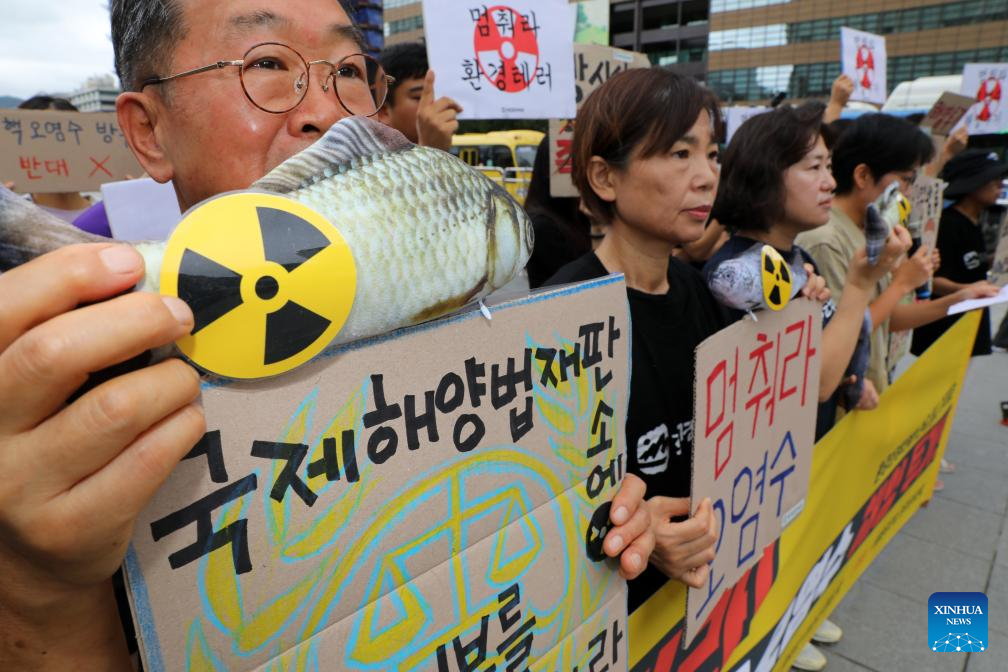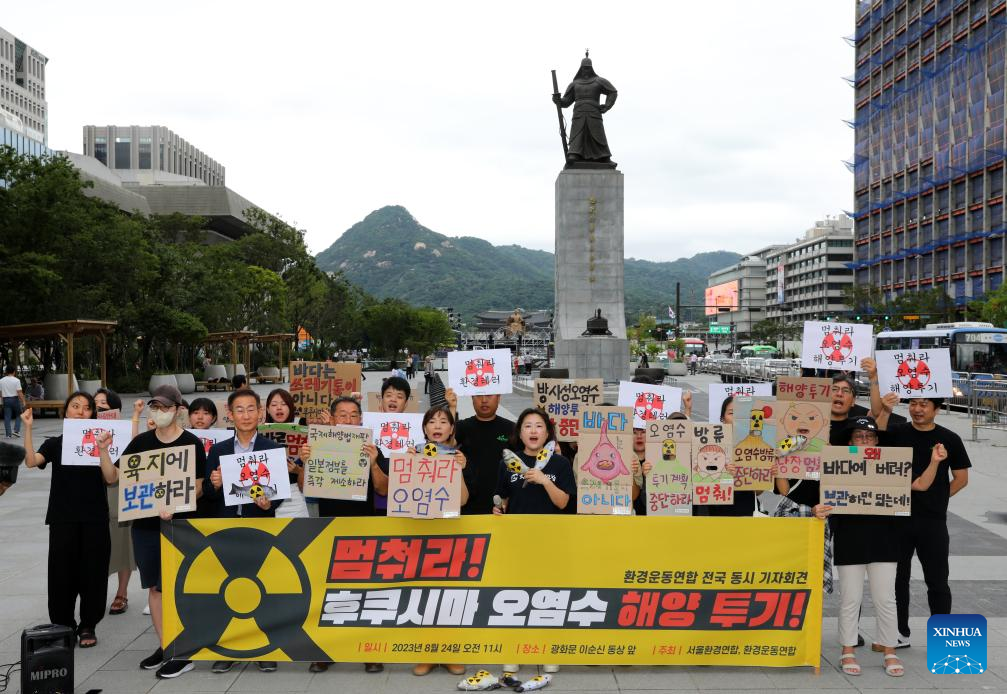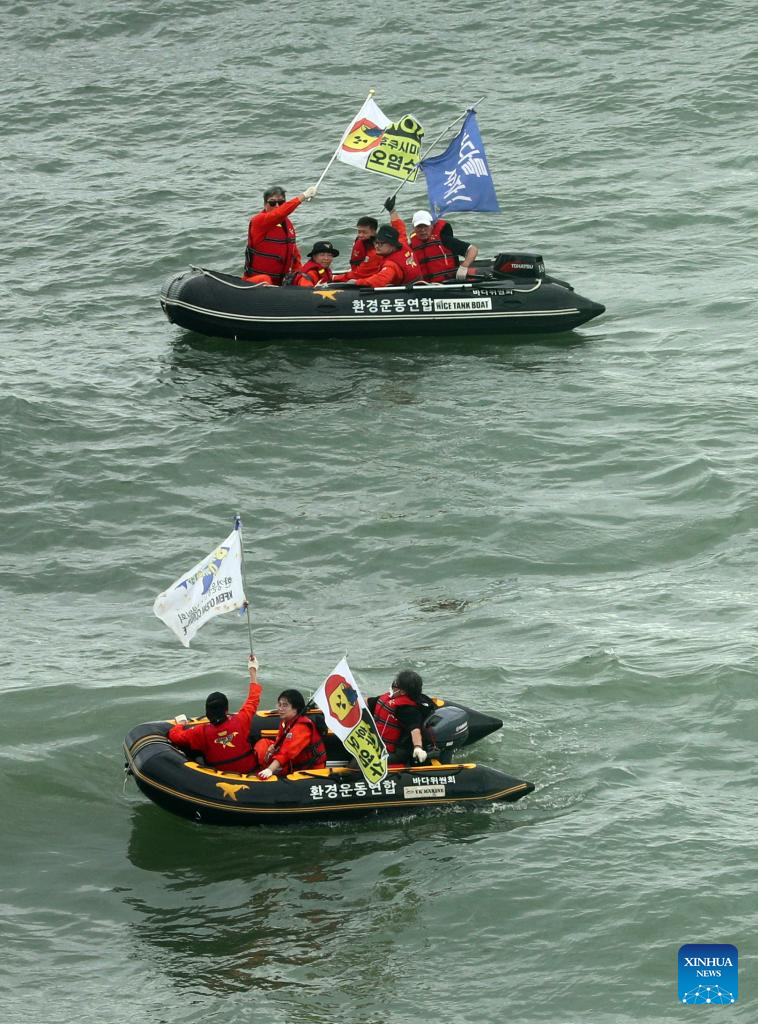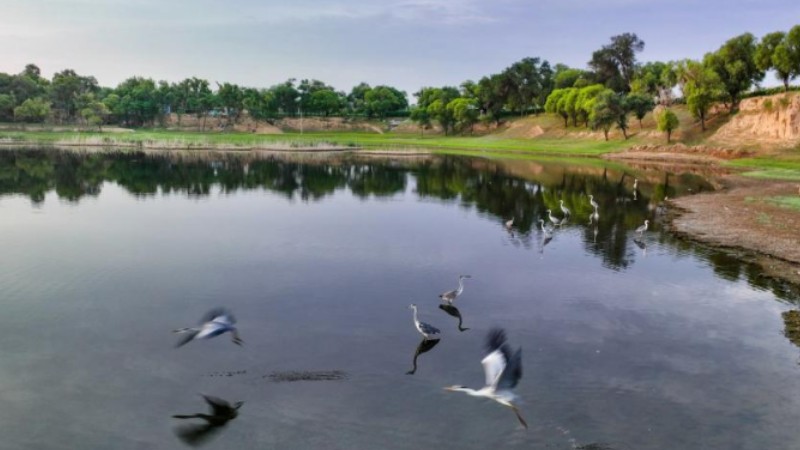S. Korean opposition lawmakers protest against Japan's nuke wastewater discharge

Lee Jae-myung (2nd, L, front), chairman of South Korea's main opposition Democratic Party, and parliament members protest against Japan's decision to release nuclear-contaminated wastewater in Seoul, South Korea, Aug. 24, 2023. Japan started releasing nuclear-contaminated wastewater from the crippled Fukushima Daiichi Nuclear Power Plant into the Pacific Ocean on Thursday, despite raging opposition from both at home and abroad. (NEWSIS via Xinhua)
SEOUL, Aug. 24 (Xinhua) -- Lawmakers of the South Korean main opposition Democratic Party on Thursday protested against Japan's discharge of nuclear-contaminated wastewater into the ocean, pushing for bills to legislate the right to indemnity claims against the Japanese government.
"Despite international concerns and opposition, Japan eventually chose the worst environmental catastrophe against humankind. Just as Japan infringed on the Pacific with guns and swords during World War II, it now threatens the entire humankind with radiation," Democratic Party leader Lee Jae-myung said in an emergency general meeting of the party lawmakers at the parliamentary building.
"The day of Aug. 24, 2023 will go down in history as a day when Japan committed another crime against humanity that will never be erased. Together with the entire world, I strongly condemn Japan," Lee said.
Lee vowed to fight to the end against Japan's "heinous crime of environmental destruction" to turn the ocean into a dumping ground for nuclear wastewater, adding that his party will push for bills to support the affected fishermen and the fishery industry.
Despite public concerns and raging opposition from both home and abroad, Japan started releasing the first batch of nuclear-contaminated wastewater from the crippled Fukushima Daiichi Nuclear Power Plant into the Pacific Ocean earlier in the day.
The Democratic Party proposed a set of special safety measures bills to ban the import of all fishery products feared to be exposed to the nuclear-contaminated wastewater, including seafood from Fukushima and other regions.
Under the bills, the country-of-origin regulation would be strengthened to prevent processed food, made of seafood from Fukushima and other dangerous regions, from being distributed here, while recognizing radioactive wastewater damage as a fishing disaster to support the fishing industry.
The bills also sought to legislate the right to indemnity claims against the Japanese government by creating a fund first to support the affected, such as fishermen, merchants, and those processing and distributing fishery products, and demanding reimbursement from the Japanese government later.
Together with civic group activists, some of the Democratic Party members rallied against the Fukushima wastewater discharge near the presidential office in central Seoul.
"Japan committed a criminal act of damaging the ocean that is a common asset of humankind. (Japan) will pay the price for sure," Woo Won-shik, a Democratic Party lawmaker, said in the demonstration.
Woo pointed out that the wastewater discharge was in clear violation of international agreements such as the UN Convention on the Law of the Sea and the London Convention on the Prevention of Marine Pollution by Dumping of Wastes and Other Matter.
One activist who participated in the rally urged the South Korean government to file a lawsuit with the International Tribunal for the Law of the Sea against the Japanese government for violating international laws and causing huge damage to neighboring countries.
The protesters shouted slogans of "Dead against dumping nuclear-contaminated wastewater into the ocean," holding placards that read "Japan must store radioactive wastewater on its soil," and "Japan must stop an international crime of marine dumping."
A group of South Korean university students were apprehended after attempting to enter the Japanese embassy in Seoul in protest of the Fukushima wastewater discharge, according to local media.
Sixteen students, who attempted to break into the Japanese embassy right after the start of the wastewater dumping, were blocked and arrested by police on charges of trespassing and the assembly and demonstration act violation.
About 40 other fellow students held a press conference near the Japanese embassy against the wastewater discharge before being dispersed by the police.
Meanwhile, protest rallies against the dumping were reportedly staged across the country, including those near the consulate general of Japan in the southern resort island of Jeju and the Japanese consulate general in the southeast port city of Busan.

People gather to protest against Japan's decision to release nuclear-contaminated wastewater in Busan, South Korea, Aug. 24, 2023. Japan started releasing nuclear-contaminated wastewater from the crippled Fukushima Daiichi Nuclear Power Plant into the Pacific Ocean on Thursday, despite raging opposition from both at home and abroad. (NEWSIS via Xinhua)

People gather to protest against Japan's decision to release nuclear-contaminated wastewater in Seoul, South Korea, Aug. 24, 2023. Japan started releasing nuclear-contaminated wastewater from the crippled Fukushima Daiichi Nuclear Power Plant into the Pacific Ocean on Thursday, despite raging opposition from both at home and abroad. (NEWSIS via Xinhua)

People gather to protest against Japan's decision to release nuclear-contaminated wastewater in Seoul, South Korea, Aug. 24, 2023. Japan started releasing nuclear-contaminated wastewater from the crippled Fukushima Daiichi Nuclear Power Plant into the Pacific Ocean on Thursday, despite raging opposition from both at home and abroad. (NEWSIS via Xinhua)

People protest against Japan's decision to release nuclear-contaminated wastewater in Busan, South Korea, Aug. 24, 2023. Japan started releasing nuclear-contaminated wastewater from the crippled Fukushima Daiichi Nuclear Power Plant into the Pacific Ocean on Thursday, despite raging opposition from both at home and abroad. (NEWSIS via Xinhua)
Photos
Related Stories
- Commentary: Japan's nuclear-contaminated water discharge selfish, irresponsible
- China's atomic energy authority condemns Japan's release of nuclear-contaminated water
- Japan threatens planet with radioactive water
- All aquatic imports from Japan suspended
- Japan starts releasing Fukushima nuclear-contaminated water into ocean amid opposition
- We don't want August 24 to become a catastrophic day for the marine environment: FM
Copyright © 2023 People's Daily Online. All Rights Reserved.









